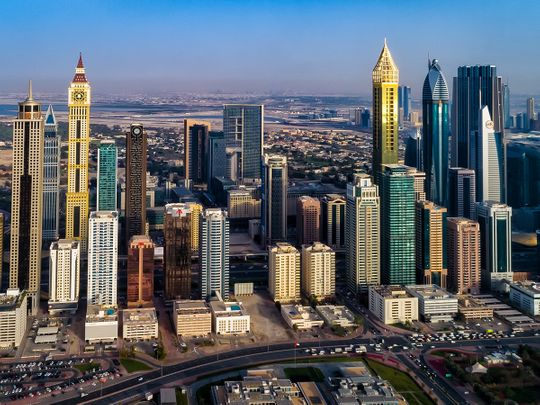
A distinctive feature of Dubai’s freehold boom was that a great many people began to think of the property market as a place that welcomed, empowered and informed outsiders.
The real estate industry, in this ideological phantasm, became the medium in which one discovered freedom and truth - the freedom to determine your own fortune and fate. And the truth that resided in the operations of an unencumbered marketplace.
During the boom-bust-boom cycles, the entire populace was in the process of becoming a “free agent nation”, and the real estate market playing a vital role in that transition. In the ante bellum years, the lure of free soil beyond the zone of settlement not only promised social mobility for the adventurous, but even more precious, the possibility of self-sufficiency.
It seemed the average folk again had that chance to become homesteaders. Indeed, the growth in wealth corresponded with the astonishing change in the skyline. But, as Dubai has embarked on yet another upward price cycle, the offplan market (with its magnetic pull of high commissions) has lured everyone from the speculator to the average middleman looking to flip at the earliest sign of an uptick.
Good while in gain mode
This model works very well when aggregate prices are on the rise. A choppier market, with liquidity constraints on the other hand, leads to glitches in the matrix, whereby middlemen get left holding the bag. This in turn ricochets throughout the value chain and leading to the rise of ‘buy now pay later’ schemes and post-handover payment plans.
Over time, this arrests the probability of oversupply. In the interim, it leads to the phenomenon of stalled real estate projects, which tends to be ignored by media punditry but leaves behind a set of investors needing help from the regulator. The current surge in offplan sales is another yellow flag in this market, serving as a note of caution even as ebullience returns.
Watch the cash
Because as we have seen, liquidity constraints loom large in vast pockets of the industry. This is both a cause for optimism as well as for pause, as the “thundering herd” of investors presumably have learnt from experience and will therefore allocate in a more efficient manner. Pause, because as newer investors enter the medium, middlemen who seek to capitalize on monetizing their commissions (which are nearly equivalent to the first down payment) overplay their hand and get trapped into commitments they cannot fulfil.
While it is part of the ‘Dubai Dream’ for everyone to reach out for the pot of gold at the end of the rainbow, the “steering” behavior by middleman seeking to maximize their commissions leads to perverse incentives, which in time leads to sub-optimal results for buyer as well as developer. Middlemen at times act in consonance with buyers, encouraging the probability of flipping behavior, especially as the consortia know that there is effectively no down payment to be made once commissions are retroceded.
Price distortion
This affects the quality of pricing data, as it obfuscates the price discounts offered by developers and sends muddled signals to other buyers. We can continue to operate in the caveat emptor paradigm, but perhaps a better framework would be to compel developers and/or intermediaries to disclose the commissions they are making in the primary market, in the way that they are in the secondary markets.
This would allow potential buyers to have a look through, which would play a factor in their decision-making. Of course, market practice is such that brokers end up offering a part of the rebate to the buyer in any event.
However, information asymmetry leaves the buyer in the dark as to how much costs are actually added on, with the consequence there is undue wealth transfer to the brokers and which can be minimized.
Nobody should be deprived of their ability to make money in a market where feverish dreams have controlled the zeitgeist since the onset of the freehold boom. The embrace by consumer culture - which has taken on many forms such as crowdfunding, allowing for people to pay as little as Dh500 for an exposure - has leveled the playing field in many respects. And allowed the median household to participate in a kind of an electronic amusement park where the richest and brightest compete with the rest.
In the midst of this, the industry (with a nudge from the regulator) could embody that ever-renewable optimism that is innate in Dubai by continuing to shine light in areas that further lead to equality of opportunity and allow for the dreams of wealth to be pursued in this city that we call home.









